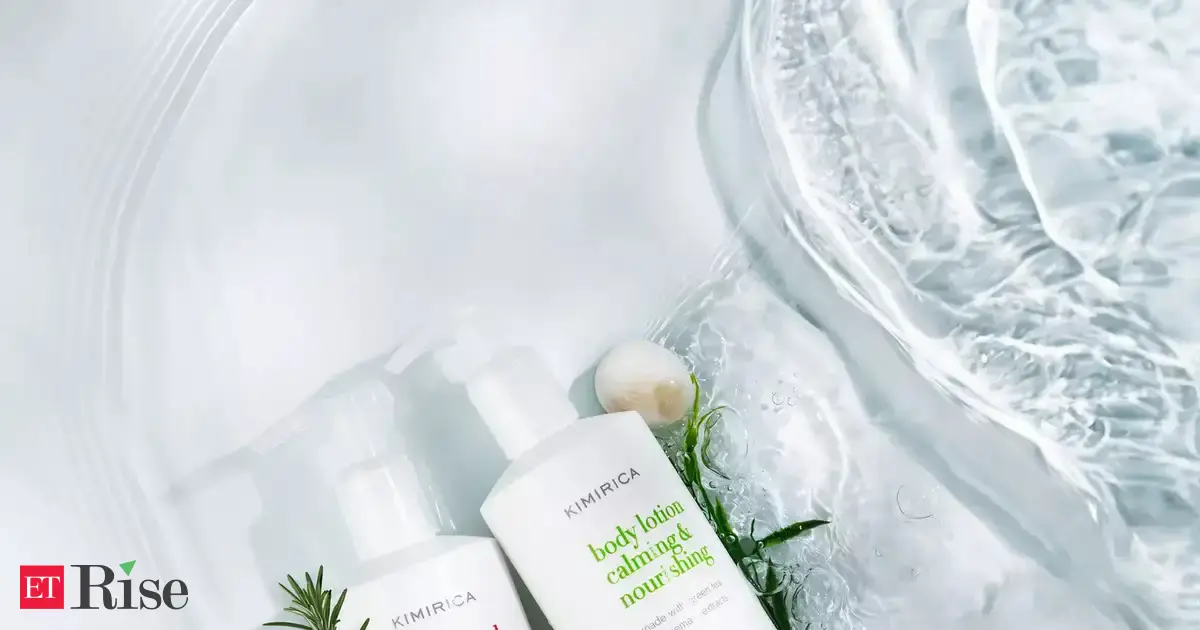By Neha Dewan
Copyright indiatimes

The personal care company boasts of being the core innovator, formulator, and manufacturer of everything they create.
Launched in 2013 in the tier II city of Indore, the personal care brand Kimirica turned its unconventional origins into a unique selling point while also attracting some scepticism. Unfazed by scepticism, four co-founders came together to create a home-grown brand that provides consumers with an elevated and experiential self-care journey.“The category we are selling—beauty products—has been sold in the country for the last 50 or 100 years. But the idea essentially was how to create products which can make people happy. I think that is what premium and luxury offerings are all about, and we are gifted in creating such unique experiences,” Mohit Jain, Co-founder and CEO of Kimirica, tells ET Digital in a freewheeling chat. “If you see, there are just a handful of such brands in the luxury premium space, as it is not easy and takes a lot of patience as well as capital to create. Achieving the scale in sales requires a lot of sacrifices and challenges to endure and still survive,” he adds. The brand has three other co-founders: Rajat Jain, who is also the Head of R&D; Kimi Jain, who serves additionally as Head of Brand Experience; and Rica Jain, who doubles up as Head of Quality Assurance, Systems and Process Optimisation.The brand derives its name from co-founders Kimi and Rica, inspired by some of the famous global brands that have been created from their family names. Incidentally, the brand derives its name from co-founders Kimi and Rica, inspired by some of the famous global brands that have been created from their family names. “If you look at some of the biggest international brands, the trend is noticeable. For instance, Mercedes was the daughter of Austrian automotive entrepreneur Emil Jellinek; Salvatore Ferragamo was the name of the founder himself, and Gucci is a family name. So, thinking of Kimirica as our brand name came quite naturally, and we cracked it. It really worked well for us,” Jain says, enthusiastically recalling the initial makings of the brand. Live EventsChildhood learningsThe seeds of inspiration were also sown through the family’s inclination towards ayurveda and holistic healing, nurtured by their grandfather, an ayurveda practitioner. “Such wellness products have been a part of our childhood upbringing. We have seen boutique manufacturing happening from our home itself. So, we always thought that we could do this business right,” Jain states. From fulfilling small local orders to shipping internationally, the brand gradually began to pave its way forward. “We started making beautiful, high-end luxury products for hotels. Then that business grew so fast that we couldn’t get time to look back at the retail vision that we had. We became the country’s largest manufacturer of hospitality products. At that time, 90% of hotels were importing toiletries from China and Europe. It has now gone down to almost zero now and we also export Made in India toiletries to 70 countries and over 10,000 hotels in different parts of the world,” the entrepreneur highlights. During the Covid-19 pandemic, the company wanted to diversify, and the period proved to be a blessing in disguise for them. “We got a chance to live the original dream, which was building a DTC luxury beauty brand, and we did all our homework during the pandemic. We launched in 2022 the retail front with our website and a boutique inside a hotel and an airport. The retail business has grown very fast; what we have done in the last 10 years in hotels, we have been able to achieve that scale in just three years of our retail journey,” Jain reckons. The personal care company boasts of being the core innovator, formulator, and manufacturer of everything they create. There is no intermediary in their product processes, and they source most of their ingredients within a 100-km radius of their manufacturing plant in Indore. Changing the mindsetLike any other start-up, Kimirica, too, had its share of rejections along the way. However, Jain takes it all in his stride. “These rejections should happen. A lot of failures have happened in our journey, but it has only helped us,” he states, while alluding to how hotel chains initially were not ready to source from a smaller player in the market.Since the brand’s formulations are vegan, cruelty-free, and made with ethically sourced plant-based ingredients, another aspect was around balancing luxury with sustainability. Besides such challenges, Jain speaks of a more difficult aspect that they had to contend with. “The main challenge during this entire brand journey has been changing the mindset that Indian products and Indian suppliers are not good. For instance, when we pitched to someone initially, they would compare Indian products to China’s. Things would have moved faster for us if such mental barriers did not exist,” he adds.Since the brand’s formulations are vegan, cruelty-free, and made with ethically sourced plant-based ingredients, another aspect revolved around balancing luxury with sustainability. So even though sustainable packaging and old-pressed manufacturing posed cost and scalability challenges, Kimirica decided to stay on course. “We overcame these hurdles by keeping everything in-house, which gave us control over quality and costs, and by investing in local sourcing initiatives like Procure Within Hundred that reduced our carbon footprint while empowering small suppliers,” the entrepreneur emphasises. Over the years, the brand has successfully navigated various challenges and established itself as a holistic lifestyle brand. The start-up has a presence in several categories, including fine fragrances, skincare, home & wellness, luxury gifting, and most recently men’s grooming. In terms of revenues, the company’s growth trajectory has been evident. In the first year, Kimirica had annual revenues of Rs 32 lakh. It now aims to grow from Rs 300 crore in FY25 to Rs 1,000 crore within the next four years. This growth is expected to be powered by their 600,000 sq. ft integrated manufacturing facility in Indore. “The facility is designed to support massive scale, reduce dependence on imports, and strengthen our position in export-led markets, such as the USA, the Middle East, and Europe. Growth will also be fuelled by expansion in fine fragrances, men’s grooming, and home & wellness, alongside deepening our retail footprint with 10+ new experiential stores opening across India and the Middle East,” Jain adds. Roller coaster rideIn fact, there is a huge appetite now in the Indian market for such premium personal care and wellness products. India’s skincare and beauty market is witnessing strong growth, underpinned by rising consumer demand for natural, clean-label, and wellness-oriented products. Valued at $24 billion in 2025, the beauty and personal care (BPC) segment, a part of the broader household and personal care (HPC) market, is projected to surpass $50 billion by the mid-2030s. Anand Ramanathan, Partner, Consumer Industry Leader, Deloitte South Asia, draws a parallel with international counterparts, detailing the opportunities and challenges at play. “In comparison, global leaders like South Korea (K-Beauty) and Japan (J-Beauty) have long dominated the premium skincare space with advanced R&D, sleek branding, and global distribution. However, India is carving out a niche with its ayurveda-based ‘A-Beauty’ proposition, which blends traditional wellness with modern efficacy,” Ramanathan says.“Despite this momentum, India still faces challenges in matching the global benchmarks in innovation cycles, premium brand perception, and regulatory ease,” he says. To truly measure up, he suggests that Indian brands must invest in global certifications, storytelling, and product innovation, while leveraging digital platforms and influencer-led marketing to build aspirational value. “With continued government support and strategic branding, India is well positioned to become a formidable player in the global skincare and beauty landscape,” he adds. According to Jain, India is at a turning point now in the luxury wellness space. He believes the industry needs to invest more in R&D, global design thinking, and manufacturing infrastructure to consistently match international standards and grow further. “We see ourselves as part of this transformation. With our storytelling-led brand approach, we are helping position India as a serious player in the global luxury wellness market. To truly be at par, the ecosystem needs more brands to adopt conscious luxury as the new standard, blending indulgence with responsibility,” he says. For Jain the journey has been so far nothing short of a “roller coaster”. “It has been very thrilling. It has been like an up-and-down roller-coaster ride because we grew so rapidly, and no one thought that a small company from Indore would create a business in a luxury-producing industry. But, as they say, life is always like a roller coaster, and it depends on how we want to live it up. We love the thrill. The journey has been very, very exciting,” he says, enthusiastic about the innings so far and the times ahead.Add as a Reliable and Trusted News Source Add Now!
Read More News onkimiricamohit jainrajat jainkimi jainrica jainexportsmake in indiabeauty
Nominate your pick for ET MSME Awards 2025 by Oct 15….moreless
Read More News onkimiricamohit jainrajat jainkimi jainrica jainexportsmake in indiabeautyNominate your pick for ET MSME Awards 2025 by Oct 15….moreless
Prime ExclusivesInvestment IdeasStock Report PlusePaperWealth Edition123View all Stories



